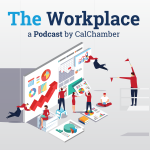In Episode 70 of The Workplace podcast, CalChamber Executive Vice President and General Counsel Erika Frank and Labor Law Adviser Ellen Savage discuss the most common coronavirus-related questions employers and human resources professionals have been asking the CalChamber’s Labor Law Helpline as they prepare to reopen their workplaces.
Below is a condensed summary of the podcast. To hear the full discussion of each topic, visit the time stamps noted in the article below.
Reducing Hours
Time discussed: 02:12
One of the most common questions Savage hears on the Labor Law Helpline is whether employees can be “furloughed” for only a day or two a week in order to cut payroll costs. She explains that such a scenario should be referred to as a “reduction in hours” and not a “furlough.” Moreover, reducing hours to cut payroll costs will depend on whether the employee is classified as exempt or nonexempt.
Whereas nonexempt employees are paid by the hour, exempt employees are generally paid their full salary “if they perform any work at all during the week,” Savage says. Therefore, a company may save costs by reducing the work hours of nonexempt employees, but not by reducing the work hours of exempt employees.
Vacation Time
Time discussed: 04:23
Callers to the Helpline also want to know whether employees can be required to use their vacation time since business demand is low, Savage tells Frank.
When it comes to nonexempt workers, “employers have the right to control vacation costs by telling employees when to take vacation,” she says. There are, however, gray areas when it comes to exempt employees, Savage says.
On the opposite side of the issue, employers have also asked whether they can deny vacation requests during this COVID-19 pandemic crisis. Savage points out that there are essential businesses that have too much demand to be able to accommodate vacation requests at the moment.
She explains that employers are allowed to set up blackout periods and ask that workers not take time off until after the blackout period is over. Savage adds that if an employer establishes a new blackout period, the company’s vacation cap should be expanded to accommodate the hours accrued during the blackout period.
When Employees Don’t Return
Time discussed: 07:58
As businesses prepare to reopen, the No. 1 question asked at the Helpline is, can an employee refuse to return to work?
Savage explains that someone cannot be forced to return to work, but refusing to return to work may disqualify the person from receiving unemployment benefits.
If, for example, a business has abided by local and state guidelines and is providing adequate employee protections, an employee who refuses to return to work out of a general fear of contracting COVID-19 would not qualify to receive unemployment benefits.
If, however, the business does not have proper protective measures in place, an employee can use the lack of protective measures as a valid reason for not returning to work and will thus be able to claim unemployment benefits.
Savage also explains that an employee who earns more on unemployment cannot use the higher pay as a valid reason for refusing to return to work and would not qualify for unemployment benefits.
Hiring Employees Back
Time discussed: 15:44
If hiring an employee back, Savage recommends that if there have been changes to the company’s employee handbook or if the employee no longer has the employee handbook, that a new handbook be given. Employers should also review their new hire checklist to determine what documents the employee will need to re-sign.
While employees may not need to re-sign all employment documents, employers should fill out the I-9 form, Section 3 again, Savage says.
Temperature Checks at Work
Time discussed: 19:00
Before the COVID-19 pandemic crisis, checking employees’ temperature was not permitted. Now, however, employers are allowed to do so due to the direct threat COVID-19 has on the workplace, Savage tells Frank.
If checking an employee’s temperature, employers should compensate workers for their time, Savage stresses.
If, for example, the work shift starts at 8 a.m., but the employer is asking workers to come to work at 7:30 a.m. to have their temperatures checked, the employer needs to compensate its workers for the additional 30 minutes, she explains.
Sick Employees
Time discussed: 22:30
So, what happens if an employee is sick or has been sick?
Savage explains that an employee can return to work when the person has clearance from a doctor, and has passed the 14-day quarantine that is generally recommended.
Subscribe to The Workplace
Subscribe to The Workplace on iTunes, Google Play, Stitcher, PodBean and Tune In.
To listen or subscribe, visit www.calchamber.com/theworkplace.


